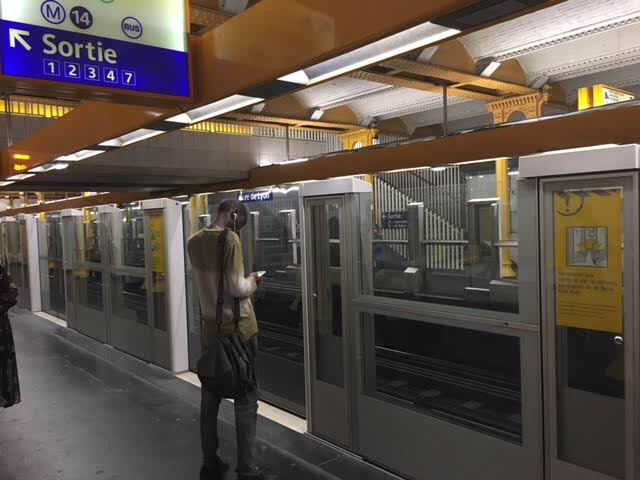December 12, 2017
Geneva
A few weeks ago, I took the 6:14 TGV from Geneva to Paris. I usually remark to my French colleagues about how I came in on the “tey-zhey-vey.” Of course I could just say that I took the train, but for some reason I feel the need to signal that I am not a typical dense American, but someone who has lived in Europe for ten years and can speak fluently about public transportation. I always find this sort of behavior highly obnoxious. Nevertheless, I continue saying “tey-zhey-vey.”
The train eased out of Geneva silently, and on time. The first hour of the trip weaves through the Jura Mountains on the northeast side of Lake Geneva, and I’ve learned the hard way that doing work during this first hour is a good way to make yourself sick, so I listened to music until we arrived in Bourg-en-Brest. It was still pitch black outside. Eventually, a powdery blue dawn settled into place.
You feel how fast you’re going on a high-speed train (TGV = Train Grande Vitesse = “High-Speed Train”), much more so than on an airplane. To remove any doubt, the little LED screen next to the door displayed the speed as we moved through the flat sections west of Dijon. We spent around 30 minutes hovering near 295 km/hour, and I kept watching the screen to see if we would crack 300, but we never did. A few years ago, a train I was on from New York to Boston ran into someone (unfortunately, at grande vitesse), killing him and propelling his body into the marshes near Mystic, Connecticut. The train shuddered to a stop, and we sat in puzzled silence for a few minutes, not yet knowing about the poor guy we had just killed. Police strode down the aisle, wearing big orange life preservers small children wear on sailboats. Notably using the passive voice, the conductor announced that the train “was stopped because of a fatality.” A woman in a tweed suit released one sharp sob, like a seal barking.
I work for a large pharmaceutical company. Our office in Paris is on Rue de la Boetie in the upscale 8th arrondissement. Since the Bataclan attacks, you can’t just walk through the big glass front doors into reception. Instead you have to use a smaller delivery entrance to the right, manned by two tense-looking security guys in navy blue who manage to look both menacing and stylish as they check your ID. I don’t have my own office in Paris, but the company recently started this program called “Greenseat,” where someone can “loan” their desk to you if you happen to visiting be out of town. They made these little metal signs that people can kind of clamp over the wall of their cubes, with a little dial indicating how long that cube is disponible for visitors. Whoever produced the little metal signs didn’t take into account that one end would hang over the opposite side of the cube-wall, like a hook, so the “Greenseat” logo appears upside-down when you look at it from outside. This logo, with leaves tendrilling from “n” and “t,” along with the name itself, are clearly meant to show how eco-friendly the company is, sharing scarce resources and all. A more cynical interpretation is that the company is trying to save money by cramming more people into fewer square meters of office space. That said, my feeling as I slide into a disponible desk near the window on the 3rd floor is one of slight gratitude rather than complaint.
I work with people from all over the world, but all of my meetings today happened to be with French people. Jérôme from Business Development, who I meet with for no discernible reason, is a skilled employer of a very French mannerism in which you punctuate a thought with a quick exhalation while puffing out your cheeks and raising your eyebrows. This can also be written as “pfff,” and it expresses a certain knowing but highly skeptical exasperation with a situation. I later tried this in front of the bathroom mirror and looked like I was trying to to discreetly belch.
I ate lunch by myself in the office canteen, reading The New Yorker Johnny Hallyday obituary on my phone. Johnny (you only need his first name; the French will know who you mean) rose to national fame in the 60’s as “the French Elvis,” and in the taxi earlier I had caught fragments on the radio about a big homage being planned for Saturday on the Champs Élysées. The English-language coverage of his death spoke of him as a uniquely French phenomenon: completely derivative, manically adored in France, completely unknown everywhere else. If you put a gun to my head, I couldn’t name a single Johnny Hallyday song, but I’ve seen his picture a lot on Paris Match posters outside the newsstand, always above a dramatic headline involving a motorcycle accident or lurid betrayal. Johnny’s face always struck me as heavily surgically enhanced—meaty lips like two slugs, eyes fixed in a squint. One day I came across a younger photo of him and saw that he actually always looked like that. Evidently one of Johnny’s former wives called Emmanuel Macron at two in the morning to inform him of Johnny’s demise.
After lunch I got a coffee at the inferior coffee machine. Because I have a Swiss employee badge and not a French one, I can’t use it to buy Nespresso capsules for the really good coffee machine (the fact that Nespresso capsules actually come from Switzerland doesn’t help me here). Nespresso capsules used to be free, just sitting there in boxes next to the Nespresso machines, but they starting charging for them last year. So far my company hasn’t tried to position this as an “eco-friendly” maneuver. In any case, even the inferior coffee machine makes decent coffee, by most standards.

When I boarded the 19:14 TGV back home, a young woman was sitting in my seat, talking to the woman next to her as if they were friends. We engaged in the usual ritual where she asks if I wouldn’t mind sitting in her seat so she could sit with her friend, which was fine with me. She pointed to the other end of the train car and said “vingt-huit,” so I smiled and nodded and went looking for seat 28. On the TGV, the seat numbers are assigned in a completely indecipherable system possibly involving grouping all prime numbers together, so I walked back and forth a few times, like a golfer searching for a lost ball. Finally she got up and walked toward me and said in English, “I show you; it’s twenty-eight,” and led me toward the adjacent car, where seat 28 was. I stammered out a few sentences of French to make it clear that I hadn’t realized that seat 28 was in the next train car, etc. She gave me a closed-mouth smile with expressionless eyes and walked back to her/my seat.
Installed in seat 28, I watched a woman across the aisle watching Seinfeld on her laptop. It was the episode when George gets cold feet about marrying Susan and tells Elaine who tells her neighbor the rabbi who tells the whole neighborhood. The English subtitles were turned on. Every now and then she would scroll back a few seconds and re-watch, so I assume she was working on her English, or at least double-checking that she understood something. After a couple of episodes she put her computer into a stylish little denim sleeve, like a pillowcase, and then she put on eyeshades and slept.






